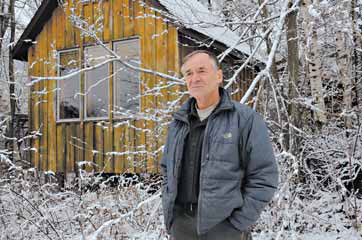Nature's undertakers offer guidance
Updated: 2013-03-03 08:05
By Claudia Dreifus(The New York Times)
|
|||||||
|
Bernd Heinrich says he has an affinity for scavengers, having been one himself in Germany. Paul O. Boisvert for The New York Times |
For much of the year, Bernd Heinrich spends his time at a cabin he built in a remote forest in western Maine. The cabin has no indoor plumbing and no electricity, he says - just a tree growing inside it.
An emeritus biology professor at the University of Vermont, Dr. Heinrich, 72, sees the New England forest as a living laboratory to study nature's changes. Over the years he has translated his observations into 17 popular books on nature and the animal world, including ones on bumblebees, dung beetles and geese.
And lately he has been studying how animals die.
Dr. Heinrich's book "Life Everlasting: The Animal Way of Death" was published last summer by Houghton Mifflin Harcourt. A condensed and edited interview follows.
Q. How did you come to write a book about animal death?
A. I first started thinking about it when a former student, Bill, wrote saying he was terminally ill and what would I think about his having a "sky burial" on my property in Maine? He wanted to leave his body to the ravens.
Bill's letter got me thinking about how scavengers cleanse the world so there's room for new life. I'd studied ravens and beetles, scavengers who are key actors in natural recycling. I may have felt some affinity for them because we - my parents, my sister and I - had once been scavengers ourselves.
Q. Scavengers?
A. Yes. At the end of World War II, in Germany, my family escaped the advancing Red Army and lived in the forest. My father was an entomologist and he believed the most awful place to be in a war was a city. We ate by scavenging. We trapped mice. I remember finding a dead boar, and my sister and I ate it.
But to return to Bill: I wondered if his idea was feasible. I began doing little experiments. I put out roadkill - mice, raccoon, a shrew - and then watched for who came and how nature's undertakers - burying beetles, maggots, gorgeous green bottle flies - broke the carcass down.
The entire scene was about transformation. A mouse would die and get eaten and it became beetles. Or its molecules could become part of a hawk or an owl. I looked at a moose and a deer carcass and I was fascinated by how quickly even big things disappeared in nature.
Q. Did you find it difficult to work with roadkill?
A. A carcass is a very active scene. It's not so much about death as life. The carcass provides a huge amount of concentrated food for the animals who are recyclers. So you get competition and all kinds of interesting animal behavior.
Ravens are very appealing. I've never met a raven I didn't like. I can't find maggots appealing, but after a while I did get used to them.
Q. In some cultures, there's a hatred for vultures and ravens. Do you understand it?
A. It's because of their association with death. They are blamed for it. Ravens get blamed a lot for killing a lot of things when, in fact, they mostly eat the dead and the nearly dead. It's an illogical association that comes from a lack of understanding of what these animals do. Consider what would happen in the ocean if nothing ate the dead fish. Eventually, the ocean would be up to the top with dead fish.
If there were no recyclers, nature would stop.
Q. Many of the scavenger species are now endangered. Why?
A. With some of the larger scavengers - the condors and the vultures - we've hunted out their food base. Also, we are using poisons to kill competitors for our own food sources - rats and mice. Then owls and hawks eat these rodents and die. With vultures, some of the medication fed to livestock is toxic to them. They eat dead cattle, traditional food, and then they die. The ecosystem is very complex and we can't know what will happen if these animals disappear.
Q. Are humans and their remains part of that complex ecosystem?
A.I think so. But human death is becoming more and more divorced from nature. We pump our dead with polluting chemicals, put them into airtight boxes and then plant them in precious real estate that could be used for agriculture. We think we're denying death that way.
Q. What ever became of Bill?
A. He's still alive. Happily that sky burial hasn't been required.
The New York Times
(China Daily 03/03/2013 page11)
